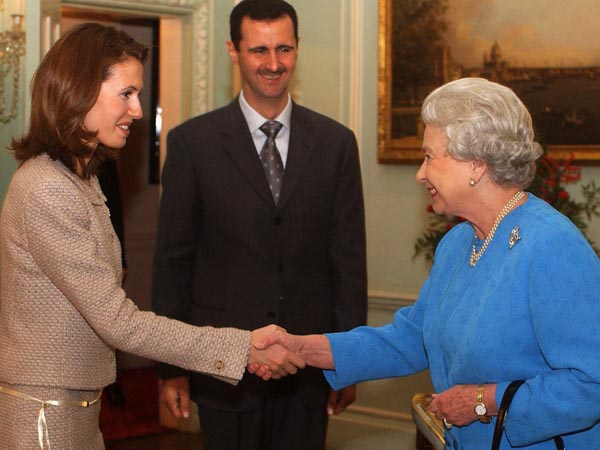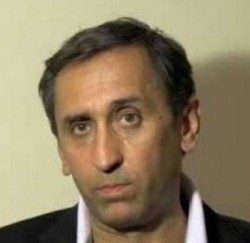
There's a claim circulated endlessly on the internet that the conflict in Syria is a "regime change war" orchestrated by western powers. As far as many of the Assad regime's defenders are concerned, this is established fact. To quote one of them – Piers Robinson, writing for the Open Democracy website – the existence of long-standing "western intentions and actions" aimed at achieving regime change in Syria is "not in doubt".
It's true, of course, that there have been calls from western leaders, among them Barack Obama, for Assad to step down – but those were in response to atrocities after the conflict had begun. What the regime's defenders claim is different: that the west had been plotting for years to topple the regime. According to Robinson it's a strategy that "has been in play since 9/11".
Constant repetition of this idea on Twitter along with various "anti-imperialist" and conspiracy websites has helped to give it popular credence even though the historical record does not bear it out.
If you weren't following Syria and its international relations before the war it's easy to be fooled by the regime-change meme. Assad's defenders make it sound plausible by drawing analogies with Iraq, where the goal of overthrowing Saddam Hussein had been official American policy for more than four years before the 2003 invasion. The Iraq Liberation Act, approved by Congress in 1998 (under the Clinton administration) vowed support for "efforts to remove the regime headed by Saddam Hussein from power in Iraq and to promote the emergence of a democratic government to replace that regime".
|
Mentioning Iraq also brings reminders of the debacle over Saddam's non-existent weapons of mass destruction. We all know that western governments lied about them and used them as a pretext for invading. It's the same with Syria, Assad's defenders say. Western powers, allegedly, are raring to topple the regime and the chemical attacks have been cooked up to provide the excuse.
So far, it sounds fairly persuasive – until you remember there have already been plenty of chemical attacks in Syria and that western powers haven't responded to any of them in the way that the Assad defenders' argument predicts.
When sarin attacks in Ghouta killed hundreds of people in 2013, the British parliament rejected military action. Obama considered it too but pulled back after Syria agreed to join the Chemical Weapons Convention.
Obama's more belligerent successor, Donald Trump, ordered missile strikes in response to the sarin attack in Khan Sheikhoun last year and the more recent chemical attack reported in Douma. On both occasions the strikes were limited in scope and posed no serious threat to the regime. Regardless of his rhetoric, Trump has shown no real inclination to become directly engaged in the broader conflict.
A long goodbye?
But what of the claim that the west had been pursuing a regime change strategy for Syria ever since 9/11 – in other words, for the best part of a decade before the conflict began?
Apart from a short period around 2005-2006, Syria was not a major concern or preoccupation among western governments or foreign policy analysts. In that respect it was very different from Iraq which between the invasion of Kuwait in 1990 and the war in 2003 had been a constant and much discussed issue.
This is not to say that relations between western powers and Syria were good. They were often difficult but had ups as well as downs. The general approach by western powers was to use a combination of pressure and inducements in the hope that Syria would change its ways. In some areas Syria cooperated; in others it did not and the broad picture, on both sides, was one of wary coexistence.
Internally, under the brutal rule of Hafez al-Assad and the Ba'ath Party, Syria had given rise to one of the region's most repressive regimes and, internationally, it considered itself part of the "resistance" to Israel and western political influence in the Middle East.
Syria's grievances against Israel were not without justification, because Israel continued to occupy part of the Golan Heights – Syrian territory it had captured in the 1967 war. Syria, in turn, hosted "political bureaux" of various Palestinian groups, including Hamas, Palestinian Islamic Jihad (PIJ), the Popular Front for the Liberation of Palestine (PLFP) and the Popular Front for the Liberation of Palestine-General Command (PFLP-GC). A report by the US State Department in 2005 commented that "Syria's public support for the groups varied, depending on its national interests and international pressure."
Syria's development of chemical weapons was also, at least initially, linked to its disputes with Israel – as a response to the Israeli nuclear arsenal. Chemical weapons were cheaper to produce and were sometimes described as "the poor man's nukes".
Making friends with Bashar
When Bashar al-Assad inherited the presidency from his father in 2000, it was widely seen as a hopeful development. At 34, he was still relatively young and seemed to be a moderniser. Among other things, he was head of the Syrian Computer Society; he made some gestures towards tackling corruption and, for the first time in almost 40 years, allowed publication of an independent newspaper (though it did not survive for long).
Bashar also had connections with Britain. A graduate in medicine, he had spent some time in London doing postgraduate studies in ophthalmology and, shortly after becoming president, he married Asma al-Akhras, an investment banker from a Syrian family who had been born and raised in Britain. Asma was a glamorous figure who attracted media attention and, with the aid of western PR firms, helped to give the regime a more acceptable image.
With a new president in Damascus, and one with significant British connections, the government of Tony Blair sensed an opportunity to develop better relations. During a Middle East tour in 2001, Blair made a hastily-arranged stop-off in Damascus where he was photographed chatting with Bashar in the courtyard of the historic Umayyad mosque. It was the first such encounter in more than 30 years and the discussions did not go particularly well. Regardless of that, Bashar and his wife were received in London the following year on an official visit which included lunch at 10 Downing Street an audience with the Queen.
In October 2003 the king and queen of Spain paid a state visit to Syria – the first since Juan Carlos had come to the throne in 1975. Agreements aimed at boosting tourism and investment were signed and the royal couple were treated to a tour of Damascus's old city.
Also in 2003, Syria and the EU began negotiating an Association Agreement. Similar agreements granting trade privileges and providing for cooperation in other areas had previously been struck with several countries in the region – Algeria, Egypt, Israel, Jordan, Lebanon, Morocco and Tunisia – the Palestinian Authority. Negotiations with Syria were eventually completed though the agreement was never signed. Nevertheless, by 2011, the EU was Syria's fourth largest trading partner after Iraq, Saudi Arabia and United Arab Emirates.
The Syria Accountability Act
While the European approach was to nudge Assad towards greater political cooperation through dialogue and inducements, the United States tended to prefer the stick to the carrot. Since 1979 Syria had been designated by the US as a state sponsor of terrorism and in 2003 – a few months after the invasion of Iraq – Congress passed the Syria Accountability and Lebanese Sovereignty Restoration Act. Instigated mainly by supporters of Israel, this sought penalise Syria for keeping its forces in Lebanon and backing militant groups opposed to Israeli occupation. It also called on Syria to stop developing weapons of mass destruction and end illicit trade with Iraq.

Thierry Meyssan, a French conspiracy theorist who had written a book blaming a faction of the US military-industrial complex for the 9/11 attacks, later described Congress's action as a declaration of war on Syria by the United States. In reality, though, it contained no threat of military action and made no mention of regime change in Syria but listed six possible sanctions:
- Reducing US diplomatic contacts with Syria;
- Banning US exports to Syria;
- Prohibiting US businesses from investing or operating in Syria;
- Restricting travel by Syrian diplomats in Washington and the United Nations;
- Banning Syrian aircraft from taking off, landing in or flying over the United States;
- Freezing Syrian assets in the United States.
The act required President Bush to impose at least two of these but allowed him to waive them (for six-months at a time) if he decided it was "in the vital national security interest of the United States to do so". Bush, who had initially opposed this measure, eventually signed it into law but issued a disclaimer:
"My approval of the Act does not constitute my adoption of the various statements of policy in the Act as US foreign policy. Given the constitution's commitment to the presidency of the authority to conduct the nation's foreign affairs, the executive branch shall construe such policy statements as advisory ..."
Bush's concern was partly about safeguarding presidential prerogative but also about the constraints the act sought to impose on American dealings with Syria. In a letter to Congress, Paul Kelly, Assistant Secretary for Legislative Affairs, explained:
"If our efforts on both comprehensive peace and the war against terrorism are to succeed, the president and the secretary [of state] will need flexibility to determine what combination of incentives and disincentives will maximise cooperation and advance our goals... For this reason, we do not believe this is the right time for legislative initiatives that could complicate our efforts. The imposition of new sanctions on Syria would place at risk our ability to address a range of important issues directly with the Syrian government and render more difficult our efforts to change Syrian behaviour and avoid a dangerous escalation."
John Bolton, the undersecretary of state for arms control – regarded as one of the most hawkish members of the Bush administration – was also critical of the moves in Congress and urged lawmakers to let the US try to change Syria's behaviour through diplomatic means before passing trade restrictions and other measures.
Confluence of interests
The complicating factor here was that Syrian-American relations were not always diametrically opposed: there were also occasional confluences of interest. Following Iraq's invasion of Kuwait in 1990, for example, Syria had provided about 20,000 troops for the US-led coalition in Operation Desert Storm (it said they would be used to help defend Saudi Arabia but not to attack Iraq). In 2002, as a non-permanent member of the UN Security Council, Syria had also voted in favour of Resolution 1441 – instigated by the US and Britain – which declared Iraq to be "in material breach" of several earlier resolutions and threatened "serious consequences" if its "violations" continued.
On the counter-terrorism front, a State Department report in 2005 noted that while Syrian officials publicly condemned international terrorism they made an exception for what they considered to be “legitimate armed resistance” – by Palestinian groups and the Lebanese Hizbullah, for instance.
Thus, although there were major areas of disagreement there were also areas where the US and Syria could, potentially, cooperate. According to the report, Syria had cooperated with the US and other foreign governments "against al-Qaeda and other terrorist organisations and individuals".
Syria also claimed to have repatriated more than 1,200 foreign "extremists" and to have arrested more than 4,000 Syrians trying to go to fight in Iraq. The State Department report added: "During the past seven years there have been no acts of terrorism against American citizens in Syria. Damascus has repeatedly assured the United States that it will take every possible measure to protect US citizens and facilities in Syria."

Withdrawal from Lebanon
After the end of civil war in Lebanon in 1990, Syria's troops had remained in the country and its intelligence apparatus kept a watchful eye on the situation there. Meanwhile, Israel controlled a smaller portion of Lebanon in the southern border area where Hizbullah – another of Syria's non-state allies – waged a guerrilla struggle against the Israeli occupation. The positive side of the Syrian presence in Lebanon was that it brought a degree of stability in the immediate aftermath of the civil war but Lebanese opposition to it grew after Israel's withdrawal from the south in 2000 and especially after the assassination of former prime minister Rafik Hariri in 2005, when suspicion fell on Syria.
Hariri's killing triggered the "Cedar Revolution" in Lebanon, with protests demanding the withdrawal of Syrian forces. This was a dangerous moment for Syria but Assad defused the situation by pulling out his troops. The following year, after a cross-border raid by Hizbullah, Israel waged a month-long bombing campaign in Lebanon but Syria, despite its close ties with Hizbullah and its official rhetoric about "resisting" Israel, judiciously remained on the sidelines.
To summarise, then, there is no sign that western governments, during the 10 years or so leading up to the current conflict, sought to overthrow the Assad regime or had serious plans to do so. The relationship – though fraught at times – was seen as one that could still be managed by diplomatic means and without a full-on confrontation. It's also worth noting that in March 2011, during the initial stages of the Syrian uprising, US secretary of state Hillary Clinton was still calling Assad a reformer and an article in Haaretz newspaper described him as Israel's favourite Arab dictator.
The hawks gather
This diplomatic approach to dealing with Syria did not go unchallenged, of course. There were always some voices, especially in the US and Israel, calling for a tougher line and it is mainly by cherry-picking these that believers in the regime change strategy construct their narrative of a "pre-planned" war.
One early example is the notorious "Clean Break" document from 1996. Produced by Richard Perle and several others who later became influential in the Bush administration, it advocated the removal of Saddam Hussein and the installation of a Hashemite monarchy in Iraq as a first step towards reshaping Israel's "strategic environment". Intended as a foreign policy blueprint for the incoming right-wing government of Binyamin Netanyahu, it urged a complete break with the past and suggested that once Saddam was out of the way Jordan and Turkey could form an axis along with Israel to weaken and "roll back" Syria.
Although often cited as part of the Syria regime-change meme, the "Clean Break" document – which was alarming in many ways – stopped well short of advocating the Assad regime's overthrow. Instead, it said Israel should move to "contain" Syria and offered three specific proposals in that direction:
- "Striking Syria’s drug-money and counterfeiting infrastructure in Lebanon";
- "Paralleling Syria’s behaviour by establishing the precedent that Syrian territory is not immune to attacks emanating from Lebanon by Israeli proxy forces";
- "Striking Syrian military targets in Lebanon, and should that prove insufficient, striking at select targets in Syria proper".
Aftermath of 9/11
In the article for Open Democracy quoted above, Piers Robinson – who is prominent among a group of academics pushing a pro-Assad and pro-Russia line – cites discussions between Britain and the US in the immediate aftermath of 9/11 as evidence that Syria was being earmarked for regime change.
In that context he cites a paragraph from the Chilcot report on Britain's role in the Iraq war which says (page 324):
"On 15 September the British Embassy Washington reported to London that the US now looked at the world through a new prism: US policy towards Iraq would harden, especially if any evidence emerged which linked Saddam Hussein to the terrorists. The “regime-change hawks” in Washington were arguing that a coalition put together for one purpose [against international terrorism] could be used to clear up other problems in the region."
From the tenor of the British-American discussions there's no doubt that Syria's support for terrorism was seen as one of the "other problems" needing to be cleared up. The question, though, is whether regime change in Syria was envisaged as part of that process.
Robinson discusses this in more detail in a separate academic article and quotes a declassified memo written by British prime minister Tony Blair in December 2001, headed: "The war against terrorism: the second phase". The memo, which Britain shared with the Americans, discussed what to do about seven countries: Iraq, the Philippines, Syria, Iran, Yemen, Somalia and Indonesia.
On Iraq, Blair proposed a gradual build-up of pressure on Iraq "until we get to the point where military action could be taken if necessary". On Syria and Iran, Robinson quotes another part of the memo where Blair wrote: "If toppling Saddam is a prime objective, it is far easier to do it with Syria and Iran in favour or acquiescing rather than hitting all three at once."
Robinson acknowledges that it's not clear from the memo how many of the seven countries were being targeted for regime change but says "talk of hitting Iran and Syria, countries not associated with the Islamic fundamentalist terrorism understood to have been behind Al-Qaeda and 9/11, is clearly suggestive of some kind of military action".
Rather disingenuously, however, he omits quoting the remainder of Blair's paragraph on Syria and Iran which said:
"I favour giving these two a chance at a different relationship: help and support in building a new partnership with the West in return for closing down support for Hizbollah and Hamas and helping us over Iraq. I don't underestimate the problems of this but I think it is possible."

In his Open Democracy article Robinson also says "leaked documents indicate the existence of US plans from 2006 to destabilise Syria". This refers to a diplomatic cable written by William Roebuck, the US ambassador in Damascus, assessing the strengths and weaknesses of the Assad regime.
The cable identified a number of the regime's "vulnerabilities" and suggested ways they could be exploited to America's advantage. Although this shows the US was trying to cause difficulties for the regime, there's no indication that the aim was to topple the regime, or that the Americans believed it was likely to be toppled. The cable ended by saying ...
"The bottom line is that Bashar is entering the new year in a stronger position than he has been in several years, but those strengths also carry with them – or sometimes mask – vulnerabilities. If we are ready to capitalise, they will offer us opportunities to disrupt his decision-making, keep him off-balance, and make him pay a premium for his mistakes."
Wesley Clark's tale
Robinson's final piece of regime-change "evidence" – in his Open Democracy article and in his academic paper too – is an anecdote much loved by conspiracy theorists.
The story, recounted several times by retired US general Wesley Clark, is that he visited a former colleague in the Defense Department a couple of weeks after 9/11 and was told a decision had been made to go to war with Iraq. On a second visit several weeks later the ex-colleague told him of a single-page memo which went much further, proposing to "take out seven countries in five years". Iraq, as expected, was on the list but Syria and Iran were there too. The other four countries were Lebanon, Libya, Somalia and Sudan according to some versions of the story..
Clark says he didn't read the memo himself but was told it had originated in the office of the Defense Secretary, Donald Rumsfeld. It seems to have been one example of the extreme militaristic talk circulating in Washington at the time and Clark said later it wasn't necessarily a plan – "Maybe it was a think piece ... a sort of notional concept."
In any case, it didn't happen. The five-year time span expired years ago and Rumsfeld is long gone too but that hasn't stopped the story from popping up time after time on the internet as evidence of American intentions towards Syria.
If the Arab Spring protests hadn't spread to Syria in 2011 and been met with a vicious response it's very likely that relations between Syria and western governments would have been plodding along on the same bumpy road that we saw during the decade before the conflict broke out.
Claiming there was a long-standing plan to oust the regime serves a political purpose but the evidence simply does not support it. It's a case of trying to shape the facts to fit a desired narrative – a narrative that blames the conflict on western machinations rather than decades of dictatorship. And that is an insult to the countless Syrians who, before the conflict turned violent, took to the streets demanding an end to repression.

 RSS Feed
RSS Feed

